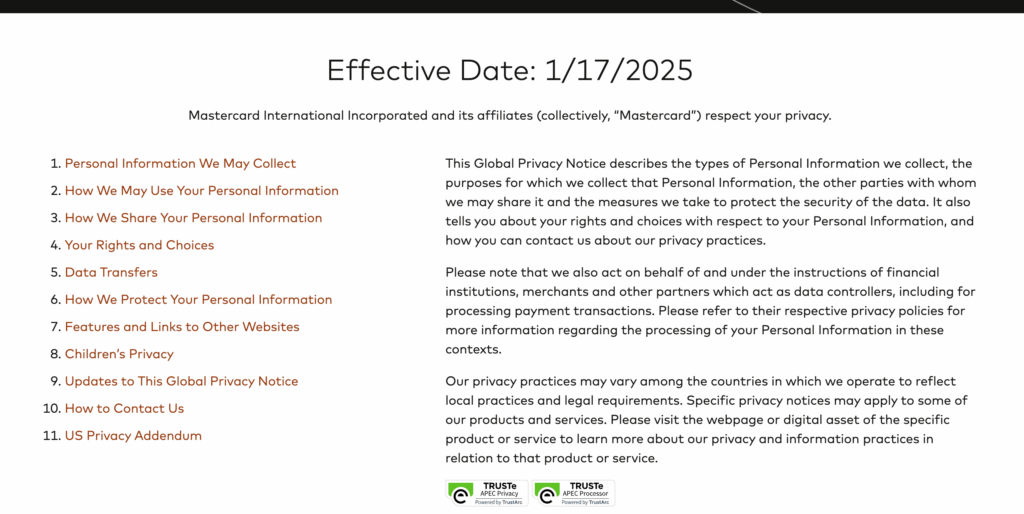If your company operates internationally, a single privacy policy won’t cut it. Different regions and countries have different privacy laws with varying consumer rights and responsibilities for companies. Failing to comply can lead to hefty fines, legal trouble, and loss of customer trust.
A global privacy policy can help.
We’ll cover everything you need to know to develop a policy for your international company to stay privacy-compliant and ahead of evolving regulations.
What is a global privacy policy?
A global privacy policy is a document that outlines how an organization collects, processes, stores, and shares personal data in compliance with multiple privacy laws worldwide.
Unlike a standard privacy policy that focuses on a single jurisdiction, a global privacy policy is designed to align with the requirements of various regulations to keep the company legally compliant regardless of where its users are located.
A well-crafted global privacy policy helps businesses manage legal obligations efficiently and communicates to users exactly what happens with their data, and that it is handled according to strict privacy standards.
By adopting a comprehensive approach, companies can avoid the risks of regulatory noncompliance and the associated potential penalties and reputational damage.
A global privacy policy versus a privacy policy: What’s the difference?
A global privacy policy differs from a standard privacy policy in scope and applicability.
- Privacy policy: Typically applies to a single country or legal framework, addressing the specific requirements of that jurisdiction.
- Global privacy policy: Covers multiple jurisdictions, integrating various legal requirements into one cohesive document.
A global privacy policy takes into account laws such as the General Data Protection Regulation (GDPR) in the European Union, the California Consumer Privacy Act (CCPA) in the United States, and the Personal Data Protection Act (PDPA) in Singapore, among others.
Such policies aim to keep businesses with an international presence or global user base compliant across different regulatory environments.
Why your website needs a global privacy policy
Businesses with an international audience or operations in multiple countries need a global privacy policy for several reasons.
Legal compliance
Different countries and regions enforce strict data privacy regulations, such as the GDPR in Europe and the CCPA in California.
Without a global data privacy policy, your company risks noncompliance, which can lead to hefty fines, legal action, and reputational damage. A well-structured policy helps businesses align with these regulatory requirements while simplifying compliance efforts.
User trust and transparency
Consumers today are more aware than ever before of how their personal data is collected and used, and they want to be in control of it.
A clear, accessible global privacy policy reassures users that their data is handled responsibly. By openly communicating data practices — such as how information is collected, stored, shared, and protected — businesses can build trust and strengthen customer relationships.
Operational efficiency
It is easier to manage a single, comprehensive privacy policy rather than juggling multiple versions for different regions and keeping them all up to date.
A unified approach reduces administrative complexity, streamlines internal data governance, and supports consistent privacy practices across all markets. This is especially beneficial for companies operating in multiple jurisdictions with overlapping regulations.
Risk mitigation
A well-implemented global privacy policy helps businesses proactively address potential legal challenges and security risks, reducing the likelihood of disputes or reputational harm.
Competitive advantage
A global data privacy policy demonstrates a strong commitment to data privacy. People increasingly prefer engaging with brands that prioritize privacy and security.
A transparent, well-executed privacy policy not only enhances a company’s reputation but can also differentiate it from competitors in industries where trust is a key factor.
When should you use a global privacy policy?
If a company operates in multiple countries, collects data from users in different jurisdictions, or offers services globally, a global privacy policy helps ensure compliance with various regulations.
Companies that handle personal data across borders should adopt a global privacy policy to avoid complications from conflicting privacy laws. Even businesses that are based in a single country but cater to international customers may need one to comply with laws like the GDPR or the CCPA/CPRA.
Who should have a global privacy policy on their website?
If your business operates across multiple countries or serves international users, a global privacy policy is essential. Selling products or services worldwide means navigating different privacy laws and maintaining compliance wherever your customers are.
If you run a digital platform — whether it’s a SaaS product, a social media network, or a content platform — you need to protect user data across borders.
The same applies if you develop mobile apps for a global audience or handle personal data for advertising and marketing campaigns targeting users in different regions.
What should a global privacy policy include?
A global privacy policy should address key aspects of data protection and regulatory compliance. There are a number of important elements.
- Types of data collected: Clearly define what personal information is collected, such as names, email addresses, IP addresses, and browsing behavior.
- Purpose of data processing: Explain why data is collected, such as for account management, marketing, analytics, or security reasons.
- Legal basis for processing: Identify the legal grounds for processing under various regulations, such as user consent (GDPR), legitimate interest, or contractual necessity.
- User rights: Inform users about their rights under different privacy laws, which can include data access, correction, deletion, and portability.
- Data sharing policies: Disclose whether personal data is shared with third parties, such as service providers, cloud hosting platforms, or advertisers.
- Data retention: Specify how long data is stored and the criteria for determining retention periods.
- International data transfers: Outline how data is transferred across borders and the security and privacy mechanisms used, such as Standard Contractual Clauses (SCC) or adequacy agreements.
- Security measures: Detail the steps taken to protect user data, including encryption, access controls, and compliance with security standards.
- Cookie and tracking policies: Provide information on tracking technologies and user control options.
- Contact details: Offer ways for users to reach out with questions about data privacy or to exercise their rights, including contact information for a Data Protection Officer (DPO), if applicable.
Global privacy laws and global privacy policies
Several significant privacy laws shape how businesses draft global privacy policies. These regulations establish fundamental principles companies must follow to ensure compliance and protect users’ data across different jurisdictions.
General Data Protection Regulation (GDPR)
The GDPR is one of the strictest privacy laws worldwide. It requires businesses to implement clear, transparent, and comprehensive privacy policies.
A global data privacy policy must include:
- A lawful basis for processing personal data (e.g. consent, contractual necessity, legitimate interest)
- A detailed explanation of users’ rights (access, rectification, erasure, restriction, data portability, and objection)
- How the company collects, processes, stores, and protects personal data
- Information on international data transfers and safeguards (e.g. SCC, adequacy decisions)
- Contact details for the company’s Data Protection Officer (DPO), if applicable
California Consumer Privacy Act (CCPA)
The California Consumer Privacy Act (CCPA) and its amendment the California Privacy Rights Act (CPRA) give California residents more control over their personal data. It emphasizes transparency and consumer rights.
A global internet privacy policy must include:
- The categories of personal data collected, sold, or shared
- Users’ rights, including the right to opt out of data sales or sharing and request the deletion or correction of their data
- A “Do Not Sell Or Share My Personal Information” link for opt-out requests
- How your business responds to consumer rights requests and data access inquiries
- Information on data retention policies
Lei Geral de Proteção de Dados / General Data Protection Law (LGPD)
Brazil’s Lei Geral de Proteção de Dados (LGPD) closely follows GDPR principles, but emphasizes user rights and consent-based processing.
A global privacy policy must include:
- The legal basis for data collection and processing
- A clear statement on users’ rights (access, correction, deletion, portability)
- Information on whether data is shared with third parties or transferred internationally
- Contact details for the company’s Data Protection Officer (DPO)
Protection of Personal Information Act (POPIA)
South Africa’s Protection of Personal Information Act (POPIA) enforces strict guidelines for data collection, processing, and security.
A global privacy policy must include:
- The types of personal data collected and how it is processed
- User rights, including access, correction, and deletion requests
- How your business protects and stores personal data
- Details on data transfers outside South Africa
- A description of lawful bases for processing personal data
Personal Information Protection Law (PIPL)
China’s Personal Information Protection Law (PIPL) is one of the most restrictive privacy laws. It requires strong consent mechanisms and strict data localization rules.
A global privacy policy must include:
- Clear consent mechanisms for collecting and processing personal data
- The purpose, scope, and methods of data processing
- A statement on data localization requirements if handling the data of Chinese citizens
- Details on how users can exercise their rights, including data correction and deletion requests
- What security measures are in place to protect personal information
Act on the Protection of Personal Information (APPI)
Japan’s Act on the Protection of Personal Information (APPI) focuses on international data transfers and security.
A global privacy policy must include:
- The purpose of data collection and processing
- Whether data is shared with third parties or transferred internationally
- Measures taken to protect personal data security
- Users’ rights, including access, correction, and withdrawal of consent
- Procedures for notifying users in the event of a data breach
How to handle conflicting legal requirements
Global businesses often face differing privacy laws. For instance, the GDPR in Europe focuses on user rights and strict data processing rules, while China’s PIPL requires data localization and explicit consent. Balancing these regulations can be tricky.
When managing conflicting laws:
- Understand key differences: Know the requirements of each law. The GDPR offers multiple bases for processing data, while the PIPL focuses heavily on consent and data localization. Make sure to address both in your global data privacy policy.
- Establish a legal basis: The GDPR lets you choose from several legal bases for data processing. In contrast, the PIPL prioritizes consent. When one law is more strict and the other is more flexible, address the needs of the stricter law.
- Handle cross-border data: Establish proper safeguards for transferring data internationally. The GDPR demands mechanisms like Standard Contractual Clauses, while the PIPL has strict rules on keeping data within China.
- Be transparent: Clearly explain how data is handled in different regions to maintain user trust and compliance.
By addressing these differences, you can comply with multiple laws and protect user privacy across borders using global data privacy notices.
Adopting best practices has long-term benefits as it shows your company does more than the minimum to respect privacy, and can mean less work in the future as regulations evolve and additional requirements are introduced.
Global privacy policy example
Let’s take a look at Mastercard’s global data privacy notice.

Their global privacy policy is structured to provide transparency and align with global privacy laws. It clearly outlines how personal data is collected, used, and shared, which helps establish compliance with regulations such as the GDPR and the CPRA.
The policy also specifies the types of personal data collected, including transaction details, service usage, and identity verification data. It explains the purposes of data collection, such as processing transactions, improving services, and fulfilling legal obligations. This level of detail meets the transparency requirements set by many global privacy laws.
In addition, it addresses user rights. Individuals are able to access, correct, or delete their data, which aligns with the GDPR and the CPRA.
It also acknowledges cross-border data transfers, with references to safeguards in place to protect personal information. This is essential for compliance with laws like the GDPR and the APPI, which impose strict rules on international data transfers.
Lastly, it includes security measures, demonstrating Mastercard’s commitment to protecting user data.
Give your audience control over their privacy with a global privacy policy
A global privacy policy is a vital tool for businesses operating internationally or serving users in multiple jurisdictions. It supports legal compliance, builds trust with users, and simplifies data management.
A well-structured global privacy policy not only mitigates legal risks but also demonstrates your company’s commitment to user privacy and data protection.

